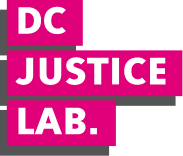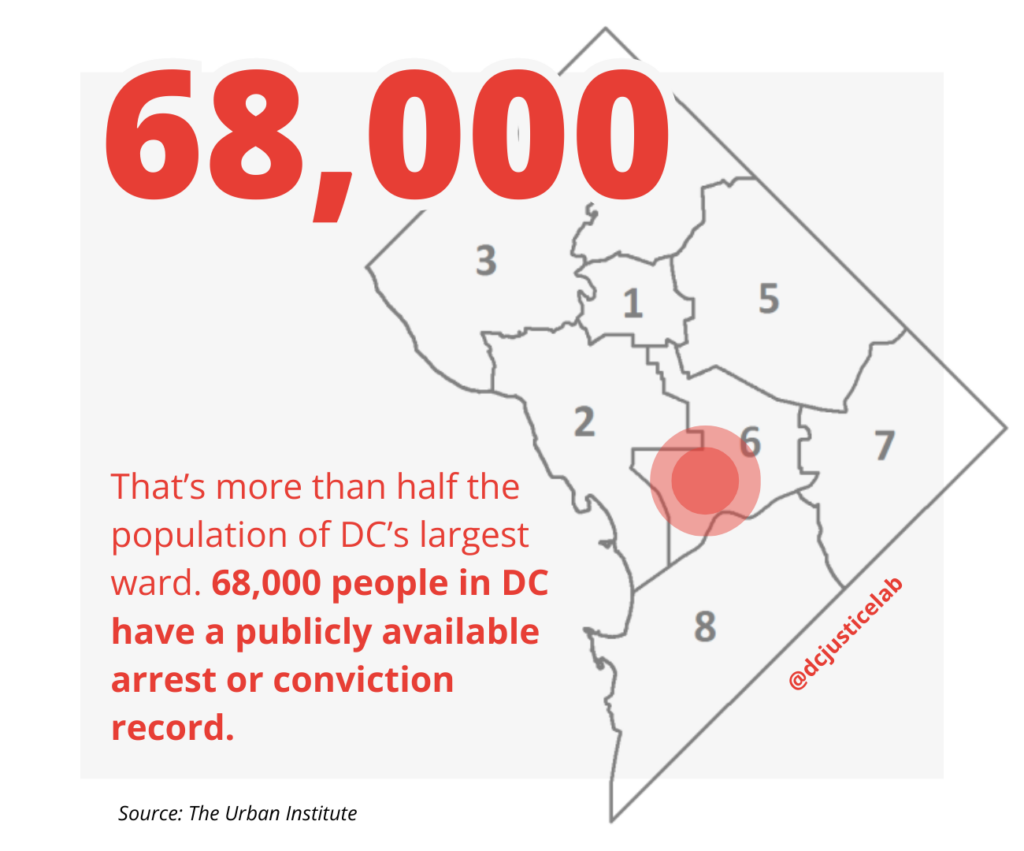
Criminal record sealing and expungement
Arrest and conviction records are lifetime barriers to employment and housing.
One in seven DC residents have criminal records, and they face hundreds of laws, policies and practices that can prevent them from getting a job, finding housing, pursuing an education, and contributing to society and our community. Experts say DC’s expungement and sealing processes to remove a criminal record are “one of the most restrictive” in the country. The fairest and most effective way to fix this problem is to establish a process that automatically removes someone’s criminal record after a certain period of time. DC has taken steps toward automated record sealing and expungement. But the law is still too complicated, needs funding to be implemented, and more changes are needed so that more people can access relief, faster. DC is falling behind places like California, which have helped millions of people expunged and seal their old criminal records.

What you need to know
Old criminal records present lifetime barriers to someone's mobility and stability.
Whether it was a conviction for a crime or an arrest that never led to a formal finding in court, criminal records remain on public databases for years. Hundreds of policies and practices in the District can prevent someone with a criminal record from succeeding economically or in other aspects of life: Nearly 7 in 10 people with a felony conviction said it made it more difficult to get a job, and nearly 6 in 10 said it was more difficult to find housing. Even a record of an arrest that did not lead to a conviction can limit callbacks for employment and cause individuals to drop out of the formal labor market. People with records report that because employers know that they have limited options, they are more likely to be underpaid, and face harassment. These barriers increase the likelihood of people engaging in the informal economy and ending up back in the criminal legal system.
DC’s “Ban the Box” laws do not offer enough protection.
Policymakers recognize the negative impact a criminal record can have on someone’s economic success. The city and the federal government have taken some steps to restrict when inquiries about past criminal records are allowed in a hiring process or when accessing public or private housing. But these “ban the box”-type laws only target a few of the restrictions, and most people and employers do not know these laws exist, While there are 68,000 people with criminal records in DC, the DC auditor reported that only 417 people filed complaints under the ban the box law claiming discrimination in the employment process. The auditor showed, only 25 percent of employers were familiar with the “ban the box” law. One study on “ban the box” found that it actually increased racial discrimination in the hiring process, as employers may make assumptions about someone’s criminal justice involvement based on their race.
Black residents are disproportionately burdened by old criminal records.
While all residents experience the impact of a weaker economy because of old records, they are more likely to limit Black earnings, wealth, and success in the job market. Black people are nearly twice as likely to be arrested compared to other residents. Black people in DC are six times more likely than white residents to be unemployed, and the net worth of a typical white family is 81 times that of a typical Black family.
DC’s expungement and sealing law needs to help more people access relief, faster.
The Second Chance Amendment Act of 2022, falls short in extending relief widely: Someone sentenced for a misdemeanor offense would still have to wait ten years to see their record automatically expunged and sealed, and some drug crime arrests that didn’t result in a conviction are completely excluded from relief. The current law says, calculations around when someone is eligible for relief are made based on information kept by federal justice agencies, not the courts, making it harder for this part of the system to process expungement and sealing requests. With one study showing less than 1 in 10 people eligible for criminal record sealing or expungement actually took the steps to do so, only a law that simplifies and makes the process effective will help 68,000 people remove an old criminal record.
DC Council took some steps to implement DC’s sealing and expungement legislation.
People cannot currently get relief under the Second Chance Amendment Act because funding for it was not included in the budget – the Mayor said DC would not have the funds to make it easier to expunge and seal records under the law until 2027 and 2029. As part of the Secure DC debate at the DC Council, an amendment passed 10 to 2 to start implementing portions of the law as of October 1, 2024. While impassioned statements were made for the need to help more DC residents seal and expunge their old criminal records as soon as possible, the Mayor and the DC Council have not yet secured funding in the budget to make that hope into reality.
The DC Council overwhelmingly endorses moving up the implementation of the Second Chance Act.
WHERE TO LEARN MORE
Criminology February 2024
Collateral Collateral Consequences Resource Center March 2022
Harvard Law Review June 2020
DC Auditor June 2016
Alliance for Safety and Justice June 2016
The Brennan Center September 2020
The Quarterly Journal of Economics February 2018
Our Solutions
DC should:
- Put money in the budget to fund the Second Chance Amendment Act;
- Shorten the waiting period for people to become eligible for criminal record sealing and expungement;
- Allow every person an opportunity to ask the court for relief;
- Make it easier for the court to administer the law by changing how waiting periods are calculated;
- Recognize people with criminal records as a protected class under the DC Human Rights Code.
Contact us about this topic
special thanks
Sarah Bradach ★ Jon Carter




